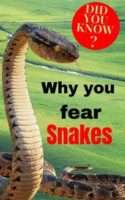Snakes are reptiles that majority of people love to hate and would rather avoid! In fact, people who fear snakes don’t even take into account whether a snake is venomous or not. This is as irrelevant to them as the letter ‘k’ letter in ‘knife’. But why do you fear snakes, and is there a scientific explanation for this?
Why People Fear Snakes
The fear of snakes is known in the science field as ‘ophidiophobia’ and it tops the list of Americans’ fears, according to a poll by Gallup.com. Even though there hasn’t been much research made locally on ophidiophobia, everyone knows someone who’d scream at the first sight of a snake. In fact, most researchers agree on the notion that snakes would rather flee than attack humans. And they will only strike back if they feel cornered and or intimidated as a sign of self-defense.
If this is the case then why do humans still fear snakes?
A group of researchers from Germany’s Max Planck Institute and Sweden’s Uppsala University decided to find out by examining the least likely portion of the population: infants.
At the institute, forty-eight six-month-old infants were examined to see how they reacted to visuals that the researchers thought would be disturbing. They were given photos of spiders and snakes on white backdrops for five seconds while sitting on their parents’ laps. To prevent parents from unwittingly influencing their infants’ reactions, they were given opaque sunglasses to wear during the trial.
The babies consistently reacted with larger pupils when they saw photographs of snakes and spiders than when they were shown control images of flowers and fish. This discovery, which was published in the journal Frontiers in Psychology, revealed that a fear of these species may be natural.
“There was a definite stress response in the brain,” said lead researcher Stefanie Hoehl. Rather than indicating fear in particular, the study says this shows an intense focus. Hoehl attributes this intense focus to human evolution occurring at the same time as historically hazardous snakes and spiders.
“It’s a very long period of coevolution—nearly 40 to 60 million years of it, that early human ancestors and spiders and snakes have interacted,” Hoehl explained. The study concluded that humans’ innate fear of these creatures could serve as defense mechanism. This notion is supported by a study published in the Journal of Experimental Psychology in 2001.
A group of university students was asked to identify photographs depicting sources of fear for the study. Students consistently rated snakes and spiders as being more dangerous than photographs of mammals or mushrooms.
Now the question that may be lingering in your head is, “If we’re born with this innate fear, then what about snake lovers that keep them as pets?”
Studies Are in Disagreement
Not all studies agree that ophidiophobia is innate. According to a study published in the journal Current Directions in Psychological Science, seven-month-old infants recognised snake images faster but showed no evidence of anxiety. This suggested that youngsters may not have an underlying dread of these species, but that they might recognise them more easily.
Social learning is largely to blame for the inconsistency and how parents react to snakes would influence their child, according to Hoehl. In future studies, Hoehl hopes to test if certain parts of snakes trigger a more stressed response.
Researchers may have different conclusions as to why humans fear snakes but one mutual agreement is that people need snakes! Snakes form a balance in the food chain as they’re both predators and prey. If snakes were extinct, the world would be uncontrollably infested with frogs and rats. And some animals that feed on snakes would die. So, reach out to a snake catcher next time you see the limbless reptile and remember that they fear you as much as you are frightened of them!
Have you ever wondered if dogs are colour blind? Read here to find out more…
Tell us: Are you afraid of snakes? What makes you afraid of them?


